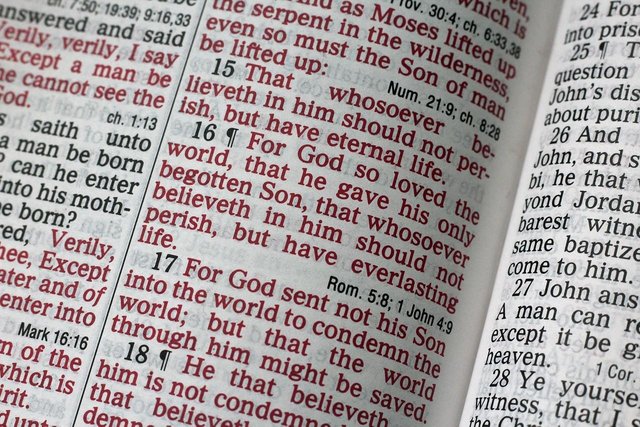Sermon: Why God's Love Ended Up in a Feeding Trough for Animals
Last week, I posted my sermon outline for a sermon I preached on John 3:16. The sermon was for the second Sunday of Advent season. I'm not the pastor of the church, but my pastor had asked me and two other gentlemen in the church to take one Sunday of the season and my Sunday was on the topic of love. Below is that sermon. It's not word for word, but it does follow the outline from last week.

Image from Pixabay.

For God so loved the world, that he gave his only Son, that whoever believes in him should not perish but have eternal life.
John 3:16

Why Did God's Love End Up in a Feeding Trough for Animals?
 Image from
Pixabay.
Image from
Pixabay. When we talk about God's love, we often relate it to Christ's crucifixion, death, and resurrection. Those events are demonstrations of God's love, but the final events of Christ's life go hand in hand with its beginnings. In fact, it would be appropriate to start at the very beginning, before the foundation of the world. That's when God formulated in His mind his plan for creation and for salvation through Jesus Christ, then set it into motion. From beginning to end, from birth to death, from eternity past to eternity future, God's love is wrapped up in the humanity of Jesus Christ.
The structure of John 3:16 rests on three clauses. We often focus on the third clause, and, particularly, one word in that clause, but my intent today is to demonstrate that the two preceding clauses, the first half of this verse, shed light on God's plan to help us understand His motivation with regard to His plan of redemption.
We'll focus on five specific words and phrases—God, so loved, world, gave, and His only son. These five words and phrases tell us everything we need to know about God's plan for His creation as it relates to the birth of Jesus Christ.
God

Image from Pixabay.
Genesis 1:1 says, “In the beginning, God created the heavens and the earth.” Like John 3:16, God is the subject. He takes action. He isn't some passive God who created the world, set it into motion, then sat back and watched as events played out in history. In fact, throughout history, God interacts with His creation in some very strange and unexpected ways. For instance, he appeared to Moses as a burning bush and spoke at one point through a donkey.
Early on, he tells a man named Abram to leave his home and go to a certain land. Then he told that man that he would make him a father of many nations. When it came time to choose a king over Israel, God chose the least likely candidate of all, a shepherd boy named David. All through the Bible, we see God interacting with His creation in very strange and unexpected ways. So why should it be a surprise that his plan of salvation is handled in the same manner?
“For,” in the John 3:16, is a connecting word. It signifies that this verse is really a continuation of the previous verses. In fact, Jesus is speaking to a Pharisee named Nicodemus and says, in verses 14-15, “As Moses lifted up the serpent in the wilderness, so must the Son of Man be lifted up, that whoever believes in him may have eternal life."
In these verses, Jesus is alluding to the time after the Israelites escaped slavery in Egypt and they're wandering around in the wilderness. They're complaining about how awful things are, so God sent fiery serpents to bite some of the people and kill them. The people repented and Moses prayed. Then, in Numbers 21: 8, God told Moses, “Make a fiery serpent and set it on a pole, and everyone who is bitten, when he sees it, shall live.” So Moses did that.
The Bible doesn't tell us how many people were saved that way. But the illustration is that Jesus is the serpent on the pole for all those who will repent of their sins.”
Loved
The second word I want to draw your attention to is the word “loved.” Actually, we can include the word “so” as a part of this because God so loved the world that....

Image from Pixabay.
The meaning here is that God loved the world so intensely, so passionately, so deeply, and so unfathomably that He took action on that love. He loved the world so much that He couldn't contain Himself and felt impelled to demonstrate that love. That word “so” tells us how much God loved the world, which is to say immeasurably.
The second thing I'd like to note is the past tense of the verb. It could just as well had been written in the present tense and it would be no less true. God does love the world. He never stopped loving it. But it's significant that John 3:16 is written in the past tense. Since God formed the idea for his plan of salvation before the foundation of the world, that's when John is speaking of. God loved the world and decided to do something about it. It would actually be true to say that God started loving the world before its foundation and He is still loving it. But His first proof for that love, His first divine action of love, was in creating the world. At the point when God first conceived of the world—at that point—He began to love it.
In his book “The Four Loves,” C.S. Lewis discussed four Greek words for “love.” These words are storgē, which means empathy, philía, which is the word the greeks used for friendship or “brotherly love,” erōs, which is romantic love, and agápē, which is unconditional love. Lewis points out that three of these types of love are possible without God's help. In fact, one doesn't even have to believe in God to be capable of empathy, or to maintain loving friendships, or to engage in romantic love. These are natural loves that all people experience at various times in their lives. However, without a firm grounding in agápē love, it's easy to distort each of the other loves. Much of our culture's infatuation with so-called “brotherly love” and romantic love is due in large part because we have a flawed understanding of God's purpose in embedding within us the capacity for these types of love.
Whenever the Bible talks about God's love, it's referring to agápē love. In fact, the Greek word for “love” in John 3:16 is a variation of this Greek word, and what it's telling us is that God loved the object of His love apart from any merit that object warranted on its own. With each of the other types of love—empathic love, friendship love, and romantic love—the object of the love must earn the right to that love. The object of empathy is someone whose situation demands that others understand how they feel. The object of friendship is someone who possesses certain qualities the lover admires. With romantic love, there must be some physical, emotional, and psychological (and, ideally, spiritual) attraction that warrants the romantic response. But with agápē, the lover looks past any flaws the object of his love may possess and loves it anyway. It has an intrinsically divine nature to it.
Although, I would argue that the Greeks, who were pagans, had a word for this concept for a reason. I think, in the Greek mind, there is a sense of agápē love embedded in the human psyche and that it plays out most often in parent-child relationships. Mothers, in particular, are capable of forming strong bonds with their offspring to such a degree that even if they commit the most heinous of crimes, they cannot stop loving their children. And I think it plays back the other way, as well. It's natural for parents to love their children unconditionally and for children to love their parents in the same way. It's so natural, that when we see real life examples where this isn't true, it shocks us. However, even this human-natured agápē love can be enhanced when empowered by the divine-natured agápē love as its foundation.
World

Image from Pixabay.
And then there's the world, the object of God's love. What is it? There are generally two prominent views regarding what “the world” is in John 3:16.
- Some view “the world” as a reference to every man, woman, and child who has ever lived or who will ever live. The idea is that God loves everyone and sent His son to die for everyone's sins. Then the individual responds in faith and is saved.
- The second view is that Jesus Christ died only for the elect. Therefore, “the world” in John 3:16 is referencing all those who have faith in Jesus.
I think both of these views come up short and miss a very important nuance in the language of John. There's truth in both views, but I think they fall short of the depth that John's language implies.
- First, God is love. Therefore, it's impossible for God not to love. That doesn't mean that He loves everyone and everything the same. He certainly doesn't love animals in the same way He loves man, his crowning achievement whom He created in His image.
- Secondly, Jesus said in Matthew 5:44-45 “love your enemies so that you may be sons of your father who is heaven.” It's unimaginable to me that God would command us to love our enemies if He doesn't love His. God's wrath toward sin is not because he hates the sinner. It's because sin must be punished. God still loves the sinner even while the sinner remains His enemy.
The Greek word used for “the world” in John 3:16 is kosmos. Vine's Expository Dictionary defines kosmos, literally translated, as “order, arrangement, ornament, or adornment.” Nearly 500 years before Christ, there lived a philosopher by the name of Pythagoras. You may remember him from your high school geometry classes as the man who discovered what is known as the Pythagorean Theorem, which is the mathematical formula for determining the length of the hypotenuse of a right triangle given the known lengths of the other two lines of the triangle. Pythagoras is also responsible for something else that is pertinent to our discussion today. He founded a school of philosophy that bore his name. They called themselves The Pythagoreans.
The Pythagoreans believed that earth and all the planets revolved around a circle of fire. Whether they arrived at that conclusion through some scientific observation or by simply creating a myth that just happened to be true isn't quite clear. But it is the first time in history, that I'm aware of, when the sun is mentioned as the center of our solar system.
When the Pythagoreans spoke of the universe, they used this word kosmos because in their minds the physical universe contained within it an intrinsic order. I don't think it's by accident that this word kosmos is used by John in the context of helping us understand who Jesus is, which is the whole purpose of his gospel. He wrote it to help his readers understand who Jesus is.
John begins his gospel with these words, “In the beginning was the Word, and the Word was with God, and the Word was God. He was in the beginning with God. All things were made through him, and without him was not any thing made that was made. ” He's careful to point out that this Word, this eternal Logos, that entered our world (he says in John 1:14 that the Word became flesh), is the same person who created this world in the first place. He's very careful to let us know that the same God who created the physical order also came down out of his seat above and outside that physical order to become a part of it. So John's view is much broader than merely the salvation of man or some small segment of it. It includes that, of course, but it's much more than that.
In Colossians 1:20, it says “through him to reconcile to himself all things, whether on earth or in heaven, making peace by the blood of his cross.” Ephesians 1:10 says God has “a plan for the fullness of time, to unite all things in him, things in heaven and things on earth.”
As we can see, He's not merely reconciling man to Himself, but his entire creation. But to get from Point A to Point Z in the timeline of reconciling events, He must first appear as a babe in a manger. God so loved the world that He wrapped His only son in swaddling clothes.
Gave
 Image from
Pixabay.
Image from
Pixabay. Merriam Webster defines gift as “something voluntarily transferred by one person to another without compensation.” In other words, a gift cannot be rejected. If it is, it's not a gift.
When we talk about the gift of God's son, there are two distinct and complementary ways I think we can understand this. First, it is voluntary on God's part to give His gift to the world. Secondly, the world has not earned or merited this gift in any way. We don't deserve it, and He didn't give it to the world to demonstrate any sort of goodness in the recipient of the gift. God gave His gift freely and it cannot be rejected.
Next, I'd like to point out that there are four specific recipients of God's gift, and each one is a recipient of God's gift in a very special way.
First, Jesus Christ is God's gift to all those whom He loves. He does not give His gift to those whom He does not love. It is specifically set aside for those whom God loves.
Secondly, Jesus Christ is God's gift to the world. As we just discussed, the world is in general God's creation, everything that was made and which God said is good, but it is also in particular every individual upon whom God has bestowed the grace of His salvation. I believe there are two ways to understand God's gift to the world.
- First, God gave His son as a gift to the world so that some will believe and have eternal life. When it says “whoever believes in him,” it does not mean that all will believe in him. It simply means that some will believe and those who do will have eternal life.
- The second sense in which God gave his son to the world is that he gave his son, in the form of flesh and blood, to the world so that the world could do with him as it pleased. And it did. They crucified him. They took God's gift, held it in their hands, and tore it to pieces. They did this because they didn't understand that it was meant for their own benefit.
Thirdly, Jesus Christ is God's gift to Mary, the mother of Jesus. God gave the gift of His son to Mary in particular because He needed a womb through which Christ, the Messiah, would be born. There could only be one, and that one was Mary, specially chosen by God for that specific purpose. The fact that she was the mother of the savior is proof that God loves each of His children in a very special and unique way. He loved Mary so much that He gave her the gift of motherhood of the one and only savior.
Fourthly, Jesus Christ is God's gift to all those who believe in Him. It is those who believe in Him who have the promise of eternal life. And God is faithful to fulfill His promises.
One and Only Son

Image from Pixabay.
Jesus Christ is God's only son in two senses. First, he is the second person of the Trinity, the Logos, the Word, the creator who stepped into His creation by being born of a virgin at a particular time and place in history and for a particular purpose.
Secondly, Jesus Christ is God's only son in the sense that He is the only person in history ever to be conceived by the Holy Spirit. He's the only person in history to come down from glory and enter the body of a babe in a manger. Not only is he the only person ever to have done so, but he is the only person who ever will. The King James Version of the Bible uses the phrase “only begotten.” Jesus Christ is God's only begotten son because he's the only person in history ever to be conceived by God. This is important because it tells us that Jesus Christ was no ordinary man. He was no ordinary babe in swaddling clothes. He was the very embodiment of love that God is, the very nature of God wrapped in human flesh and blood. And it's because of this very nature of God and the very nature of Christ that we can have faith that God's plan is better than ours because it is, from beginning to end, a plan that was conceived in love, executed in love, brought to fruition in love, and will ultimately be brought to a grand conclusion through love.
Conclusion
Hopefully, I've given you a good picture of God's love as it relates to the Advent season, and in particular, to our savior Jesus Christ. But what should this narrative do for us? We already know what it has done for us. But what should it motivate us to do?
1 John 4:7-12 reads: Beloved, let us love one another, for love is from God, and whoever loves has been born of God and knows God. Anyone who does not love does not know God, because God is love. In this the love of God was made manifest among us, that God sent his only Son into the world, so that we might live through him. In this is love, not that we have loved God but that he loved us and sent his Son to be the propitiation for our sins. Beloved, if God so loved us, we also ought to love one another. No one has ever seen God; if we love one another, God abides in us and his love is perfected in us.
If we're honest, we know we can never express our love for others the same way God has expressed His love for us—unless we get some divine help. God's love should motivate us to express that love through good deeds, through a laying down of our lives daily for the sake of others. True love is putting our own desires on the back seat so that we can focus on the needs and desires of others. That's what Christ did when he gave up his divine position to be born as a babe in swaddling clothes. It's what God did when he gave His son for that purpose. If we are to be sincere Christians and do the work of God, we must love one another in the same manner and with the same intensity that He first loved us.
If you want to listen to this sermon, there is an audio version of it on my church's website.
(All scripture references are from the English Standard Version of the Bible.)

While you're here, check out the backside 5:
- Steem Monsters Fantasy Card Fiction Contest: Malric Inferno
- Sermon Notes: Why God's Love Ended Up in a Feeding Trough for Animals
- The Last Exquisite Corpse of 2018
- Story Excerpt: Limerents in the Bog
- Ready for Another Exquisite Corpse?

Review Me, Please

Created by @EdibleCthulhu
#speculativefiction



The only thing I can think to say is:
Merry Christmas @blockurator
Merry Christmas to you too! Thanks.
A wonderful post and merry Christmas to you and yours
Thank you, and Merry Christmas to you.
To listen to the audio version of this article click on the play image.

Brought to you by @tts. If you find it useful please consider upvoting this reply.
Thanks! This is a really cool service.
@blockurator,
I am not religious ... nor irreligious for that matter. But I have to say, this was an excellent sermon. The writing is masterfully crafted and the 'line of argument' clear and concise.
It is, also, thought-provoking ... which is, perhaps, the highest compliment that can be given to any literary piece, irrespective of genre.
Very well done, Block. Your literary gifts are on full display.
Quill
Thank you, Quill. Of course, you don't have to be religious to recognize the fingerprint of God in nature. In fact, with respect to loving your neighbor, religion can often get in the way.
God's love is simple, yet sublime. I. personally, tend to complicate the love I receive on a daily basis by God. I believe if I keep a positive outlook, and I have pure love and good intentions, I will be able to share my love equally to all, regardless of what I receive in return, because God's love is by far the strongest.
Thanks for sharing!
God's love is a powerful, and empowering, force. We can't love "equally to all" without His help. Mired by sin, our imperfections get in the way.
Thanks for reading!
Congratulations @blockurator! You have completed the following achievement on the Steem blockchain and have been rewarded with new badge(s) :
Click here to view your Board of Honor
If you no longer want to receive notifications, reply to this comment with the word
STOPCongratulations! This post has been upvoted from the communal account, @minnowsupport, by blockurator from the Minnow Support Project. It's a witness project run by aggroed, ausbitbank, teamsteem, someguy123, neoxian, followbtcnews, and netuoso. The goal is to help Steemit grow by supporting Minnows. Please find us at the Peace, Abundance, and Liberty Network (PALnet) Discord Channel. It's a completely public and open space to all members of the Steemit community who voluntarily choose to be there.
If you would like to delegate to the Minnow Support Project you can do so by clicking on the following links: 50SP, 100SP, 250SP, 500SP, 1000SP, 5000SP.
Be sure to leave at least 50SP undelegated on your account.
Your sermon is directed at a Christian audience, but what you say about love is universally applicable: "True love is putting our own desires on the back seat so that we can focus on the needs and desires of others". It's what comes with maturity. The first time we see this impulse in our children we realize they have crossed an important milestone--whether it's sharing a toy with another child or offering to help a parent with a chore. I remember when my sister was buying her coop, my son, who was not yet five, heard her trying to figure out if it was financially feasible. He came forward with his piggy bank and offered it to help out. This is the kind of love you describe in your sermon.
I think, at heart, your sermon is for all people, and all seasons
As you say, humans everywhere are capable of this kind of love in a limited sense, but none of us can do it perfectly as God can. Divine agape love is on display through the power of the cross.
Thanks for reading. May you be blessed this holiday season.
Thanks for using eSteem!
Your post has been voted as a part of eSteem encouragement program. Keep up the good work! Install Android, iOS Mobile app or Windows, Mac, Linux Surfer app, if you haven't already!
Learn more: https://esteem.app
Join our discord: https://discord.gg/8eHupPq
I never realized that pastors put so much thought and planning into their sermons. They do this every week!? That's impressive!
Yeah, the good ones do. Thanks!